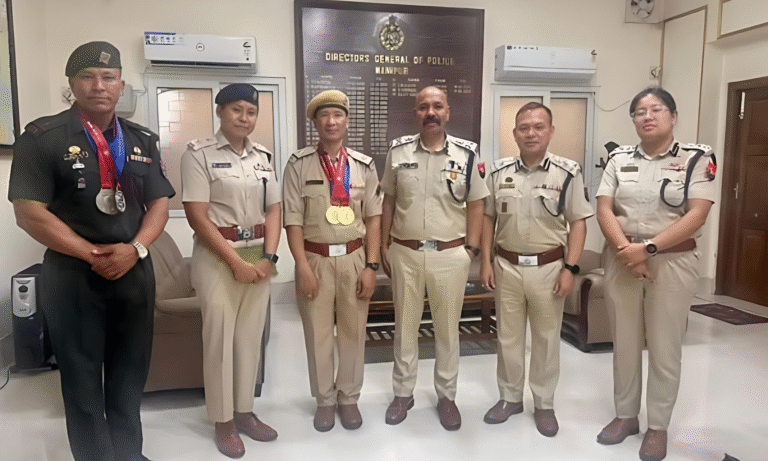Manipur Cyber Hygiene Workshop Held in Bishnupur: A Step Towards Digital Safety
Manipur Cyber Hygiene
Short Summary
A Cyber Hygiene Workshop was recently conducted in Bishnupur, Manipur, to promote awareness about cybersecurity and safe digital practices. Organized by experts and government officials, the event focused on educating individuals, students, and professionals about online threats, preventive measures, and best cybersecurity practices. The workshop aimed to create a digitally safe environment by emphasizing the importance of strong passwords, secure internet browsing, and data protection techniques. Such initiatives are crucial for safeguarding digital identities in an era where cyber threats are increasing rapidly.
Introduction
Have you ever wondered how safe you are in the digital world? In today’s fast-paced, internet-driven society, cybersecurity is no longer just an option—it’s a necessity. Recognizing this urgent need, a Cyber Hygiene Workshop was recently held in Bishnupur, Manipur, aiming to educate people on best practices for protecting themselves from cyber threats. With cybercrimes on the rise, such workshops play a pivotal role in ensuring that individuals, businesses, and institutions stay ahead of potential online risks.
This article delves deep into the significance of the workshop, the key takeaways for participants, and how such initiatives are shaping the future of cybersecurity in Manipur.
Why Cyber Hygiene Matters
Imagine your digital presence as your home. You wouldn’t leave your doors unlocked, right? Similarly, in the online world, you must take precautions to prevent cyber intrusions. Cyber hygiene refers to the habitual practices that ensure online security, including keeping devices updated, using strong passwords, and avoiding suspicious links. With increasing incidents of phishing, identity theft, and data breaches, cyber hygiene is now more important than ever.
Key Highlights of the Cyber Hygiene Workshop in Bishnupur
The Cyber Hygiene Workshop in Bishnupur was an insightful event that attracted participants from various backgrounds, including students, teachers, business professionals, and government officials. The primary objectives were:
- Educating participants on cyber threats: Understanding malware, phishing attacks, and identity theft.
- Providing best practices for digital security: Using strong passwords, multi-factor authentication, and safe browsing habits.
- Demonstrating secure internet usage: Identifying fake websites and avoiding digital scams.
- Encouraging responsible social media behavior: Protecting personal information from cybercriminals.
- Highlighting government initiatives on cybersecurity: Awareness about existing laws and regulations.
Expert Insights on Cybersecurity Best Practices
The workshop featured cybersecurity experts who provided practical tips to enhance online security. Here are some expert recommendations shared during the event:
1. Strengthen Your Passwords
Using ‘password123’ or ‘qwerty’ is an open invitation for hackers. Experts suggest using complex passwords with a mix of letters, numbers, and special characters. Better yet, use a password manager to generate and store strong passwords.
2. Enable Two-Factor Authentication (2FA)
Adding an extra layer of security through 2FA can prevent unauthorized access even if someone cracks your password. Always activate 2FA for your email, social media, and banking accounts.
3. Beware of Phishing Attacks
Cybercriminals often disguise themselves as legitimate institutions to steal your personal data. Never click on suspicious links in emails or messages without verifying their authenticity.
4. Keep Software and Devices Updated
Software updates may seem annoying, but they patch security vulnerabilities. Always install updates on your computer, smartphone, and applications to stay protected against potential threats.
5. Be Mindful on Social Media
Oversharing on social media can expose you to cyber risks. Avoid posting sensitive personal information like your home address, phone number, or vacation plans.
6. Secure Your Wi-Fi Connection
A weak Wi-Fi password can be easily hacked, giving cybercriminals access to your personal data. Always use a strong password and WPA3 encryption for your home network.
7. Use a Reliable Antivirus Program
A good antivirus program acts as a protective shield against malware, ransomware, and other cyber threats. Ensure your security software is always up to date.
The Role of Government in Cybersecurity Awareness
The Indian government has been proactive in promoting cybersecurity through various initiatives, such as:
- Digital India Campaign: Encouraging safe digital transactions and online services.
- Cyber Swachhta Kendra: A platform to detect and remove malicious software.
- Information Security Awareness Program (ISAP): Educating individuals about cybersecurity threats and best practices.
How Manipur is Leading the Charge in Cybersecurity Awareness
Manipur’s proactive stance on cybersecurity is commendable. The state has been actively organizing workshops, training sessions, and awareness programs to combat cyber threats. Schools and colleges are also introducing cyber hygiene into their curriculums, ensuring that young minds are well-equipped to navigate the digital world safely.
What Participants Had to Say
Attendees of the Cyber Hygiene Workshop in Bishnupur shared positive feedback, emphasizing how the session helped them understand the importance of cybersecurity. Many admitted that before the workshop, they were unaware of basic security measures, such as checking website authenticity or enabling 2FA.
One participant, a local business owner, shared, “I used to think cybersecurity was only for IT professionals. But after this workshop, I realize how crucial it is for everyone, including small businesses like mine.”
The Road Ahead: Encouraging a Cyber-Secure Culture
Workshops like these are just the beginning. To create a truly cyber-secure society, continuous education and awareness are needed. Schools, colleges, and workplaces should regularly conduct cybersecurity training to keep individuals updated on evolving threats.
Governments and tech organizations should collaborate to introduce user-friendly cybersecurity tools and resources that help even those with limited technical knowledge protect themselves online.
Conclusion
The Cyber Hygiene Workshop in Bishnupur was a step in the right direction for creating a more cyber-aware society. In an age where digital threats are increasing, understanding and implementing cybersecurity measures is no longer optional—it’s essential. By adopting simple yet effective cyber hygiene practices, individuals can safeguard their online presence and contribute to a safer digital ecosystem.
FAQs
1. What is cyber hygiene, and why is it important?
Cyber hygiene refers to best practices that help protect individuals and organizations from cyber threats. It’s important because it minimizes risks such as identity theft, hacking, and malware infections.
2. How can I protect myself from phishing attacks?
Always verify the sender of emails, avoid clicking on suspicious links, and use spam filters. If an email looks suspicious, contact the organization directly before taking any action.
3. What are some easy cybersecurity tips for beginners?
Use strong passwords, enable two-factor authentication, keep your software updated, and avoid sharing personal information online.
4. Can small businesses benefit from cyber hygiene practices?
Absolutely! Small businesses are often targets for cyberattacks. Implementing basic cybersecurity measures can protect customer data and prevent financial losses.
5. What role do government initiatives play in cybersecurity awareness?
Governments provide educational resources, conduct awareness campaigns, and enforce cybersecurity laws to protect citizens from cyber threats.




